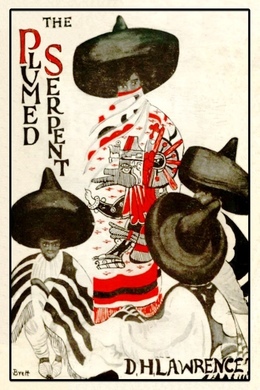
-
EPUB 488 KB
-
Kindle 665 KB
-
Support epubBooks by making a small $2.99 PayPal donation purchase.
This work is available for countries where copyright is Life+70 or less.
Description
In this notorious late novel, Lawrence’s pagan imaginings burgeon. Kate Leslie, an Irish widow touring Mexico, becomes gradually involved with a charismatic leader, and she enters a sexual relationship with his dark henchman. As the two men conspire to revive the old Aztec religion and seize power, Kate is increasingly implicated in their ‘blood consciousness’, phallic propaganda and right-wing violence. The Plumed Serpent abounds in the ‘politically incorrect’ Lawrence retains his power to shock. As a publisher once said, ‘Anything to do with D. H. L. is rather dangerous.’
682 pages with a reading time of ~10.50 hours (170747 words), and first published in 1926. This DRM-Free edition published by epubBooks, 2015.
Community Reviews
There are currently no other reviews for this book.
Excerpt
It was the Sunday after Easter, and the last bull-fight of the season in Mexico City. Four special bulls had been brought over from Spain for the occasion, since Spanish bulls are more fiery than Mexican. Perhaps it is the altitude, perhaps just the spirit of the western Continent which is to blame for the lack of ‘pep’, as Owen put it, in the native animal. Although Owen, who was a great socialist, disapproved of bull- fights, ‘We have never seen one. We shall have to go,’ he said. ‘Oh yes, I think we must see it,’ said Kate. ‘And it’s our last chance,’ said Owen. Away he rushed to the place where they sold tickets, to book seats, and Kate went with him. As she came into the street, her heart sank. It was as if some little person inside her were sulking and resisting. Neither she nor Owen spoke much Spanish, there was a fluster at the ticket place, and an unpleasant individual came forward to talk American for them. It was obvious they ought to buy tickets for the ‘Shade.’ But they wanted to economize, and Owen said he preferred to sit among the crowd, therefore, against the resistance of the ticket man and the onlookers, they bought reserved seats in the ‘Sun.’ The show was on Sunday afternoon. All the tram-cars and the frightful little Ford omnibuses called camions were labelled Torero, and were surging away towards Chapultepec. Kate felt that sudden dark feeling, that she didn’t want to go. ‘I’m not very keen on going,’ she said to Owen. ‘Oh, but why not? I don’t believe in them on principle, but we’ve never seen one, so we shall HAVE to go.’ Owen was an American, Kate was Irish. ‘Never having seen one’ meant ‘having to go.’ But it was American logic rather than Irish, and Kate only let herself be overcome. Villiers of course was keen. But then he too was American, and he too had never seen one, and being younger, more than anybody he HAD to go. They got into a Ford taxi and went. The busted car careered away down the wide dismal street of asphalt and stone and Sunday dreariness. Stone buildings in Mexico have a peculiar hard, dry dreariness. The taxi drew up in a side street under the big iron scaffolding of the stadium. In the gutters, rather lousy men were selling pulque and sweets, cakes, fruit, and greasy food. Crazy motorcars rushed up and hobbled away. Little soldiers in washed-out cotton uniforms, pinky drab, hung around an entrance. Above all loomed the network iron frame of the huge, ugly stadium. Kate felt she was going to prison. But Owen excitedly surged to the entrance that corresponded to his ticket. In the depths of him, he too didn’t want to go. But he was a born American, and if anything was on show, he had to see it. That was ‘Life.’ The man who took the tickets at the entrance, suddenly, as they were passing in, stood in front of Owen, put both his hands on Owen’s chest, and pawed down the front of Owen’s body. Owen started, bridled, transfixed for a moment. The fellow stood aside. Kate remained petrified. Then Owen jerked into a smiling composure as the man waved them on. ‘Feeling for fire-arms!’ he said, rolling his eyes with pleased excitement at Kate. But she had not got over the shock of horror, fearing the fellow might paw her. They emerged out of a tunnel in the hollow of the concrete-and-iron amphitheatre. A real gutter-lout came to look at their counterslips, to see which seats they had booked. He jerked his head downwards, and slouched off. Now Kate knew she was in a trap–a big concrete beetle trap. They dropped down the concrete steps till they were only three tiers from the bottom. That was their row. They were to sit on the concrete, with a loop of thick iron between each numbered seat. This was a reserved place in the ‘Sun.’ Kate sat gingerly between her two iron loops, and looked vaguely around. ‘I think it’s thrilling!’ she said. Like most modern people, she had a will-to-happiness. ‘Isn’t it thrilling?’ cried Owen, whose will-to-happiness was almost a mania. ‘Don’t you think so, Bud?’ ‘Why, yes, I think it may be,’ said Villiers, non-committal. But then Villiers was young, he was only over twenty, while Owen was over forty. The younger generation calculates its ‘happiness’ in a more business-like fashion. Villiers was out after a thrill, but he wasn’t going to say he’d got one till he’d got it. Kate and Owen–Kate was also nearly forty–must enthuse a thrill, out of a sort of politeness to the great Show-man, Providence. ‘Look here!’ said Owen. ‘Supposing we try to protect our extremity on this concrete–’ and thoughtfully he folded his rain-coat and laid it along the concrete ledge so that both he and Kate could sit on it.
